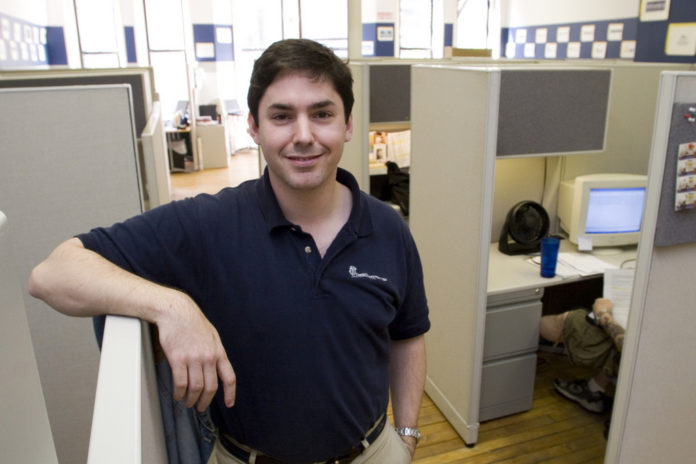
Andera Inc., a 7-year-old Providence firm marketing software to the financial services industry, offers a case study in how to successfully grow a startup in Rhode Island.
The firm recently received $350,000 in financing from the Slater Technology Fund, the state-funded venture capital organization’s second investment in Andera and the single biggest check that Slater has ever handed over to a venture it was backing, said Thorne Sparkman, Slater’s managing director.
“It’s a big bet on someone who is proving that there is a market out there,” Sparkman said of Andera’s founder and CEO, Charles Kroll, who founded the company in 2000 with a plan to sell banks and credit unions software that enables new customers to open accounts online.
Andera now counts 118 financial institutions among its customers, and it has 29 full-time employees, including three in Russia. Kroll would not disclose Andera’s revenue, but he said it is growing roughly 50 percent annually and is expected to continue at that rate or better for the foreseeable future.
“We’re not a startup anymore,” Kroll said. “We’re working on building the company into a more mature organization, and for us a lot of that is putting in place an infrastructure to support a much larger customer base.”
Kroll’s success in attracting multiple rounds of venture capital and growing Andera into a multimillion-dollar company can be attributed to several things that he did right when launching the venture, Sparkman said.
As a first ingredient, Kroll began with a clear vision of an emerging niche and an idea for how to fill it. The service he developed served an immediate demand, and Kroll’s strategy for bringing the service to market was focused and clever, he said.
And his timing was perfect, Sparkman added. Kroll guessed the growth of online account opening in financial services was inevitable before most realized it, but not too long before. Had he started trying to attract venture capital to the business plan sooner, Kroll would have been so far ahead of the curve as to be yelling in the wilderness.
As it was, Andera was more than five years into operations when the venture capital industry began investing heavily in online account opening in 2006, Sparkman said.
Kroll’s good timing actually involved two aspects, Sparkman said, explaining, “One is ‘right place, right time,’ and the other is convincing people that you’re in the right place at the right time. And Charlie did both of those.”
Sparkman characterized Slater’s initial, phased investment of $500,000 in Andera as “modest,” in part because Sparkman wasn’t convinced that online account opening was not just a limited product or a feature in a more comprehensive business plan, but a new opportunity big enough to found a company on, he said.
But Kroll was able to convince him with a “go-to-market” strategy that Sparkman characterized as comprehensive and clever. Sparkman watched as Kroll scored his first couple of banking customers during a systematic process in which he contacted hundreds of banks and followed up one bank at a time.
Sparkman sat in on several of these sales calls, and he was impressed by Kroll’s understanding of the pent-up demand that would enable the online account business to emerge and his mastery of the hurdles – real or perceived – that financial institutions faced in adopting the new capability.
“I would sit in on WebX sales pitches, and before the call he would say to me, ‘Thorne, here are the three questions they’re going to ask,’ and then he would go through it and they’d ask the question and he’d say, ‘Oh, that’s an interesting question!’ And he’d knock it out of the ballpark on the answer.”
Kroll had a few bank customers when Slater made its initial investment in Andera in 2001. Today, following Slater’s most recent investment in the company, he is aiming at growing that customer base to 1,000 financial institutions within the next three to four years.
Andera will be able to grow that fast without succumbing to a lot of the complications that often accompany such rapid growth, Kroll believes, because the company is built around a software offering that is more a service than a product. Unlike companies that develop and market more traditional installed software products, customers that purchase Andera’s software all share the company’s hosting infrastructure.
Kroll is now investing heavily in technology that will support increased demand on Andera’s servers and network as its customer base grows. As a result, the company’s work force will not need to grow proportionate to customer increases and revenue growth, he said.
“We’re investing in scalable technology that leverages shared resources, so that incrementally every customer we add is not the same amount of effort as the last customer,” Kroll said.
Sparkman believes Kroll will nevertheless be challenged by the demands of growing Andera as rapidly as he has planned, but said he believes Kroll is up to the task.
“Organizationally, there are definitely going to be challenges,” Sparkman said. “I think probably every week and month is challenging, and I think he’ll inherit new challenges as he grows. But on the basic blocking and tackling – can he recruit and hire, that kind of stuff – he’s done really well.”
“Charlie’s been making payroll since he was a junior in college,” Sparkman continued. “He’s a young man, but he has experience beyond his years, and you will never outwork him. He’s not a guy you bet against, you know?”












